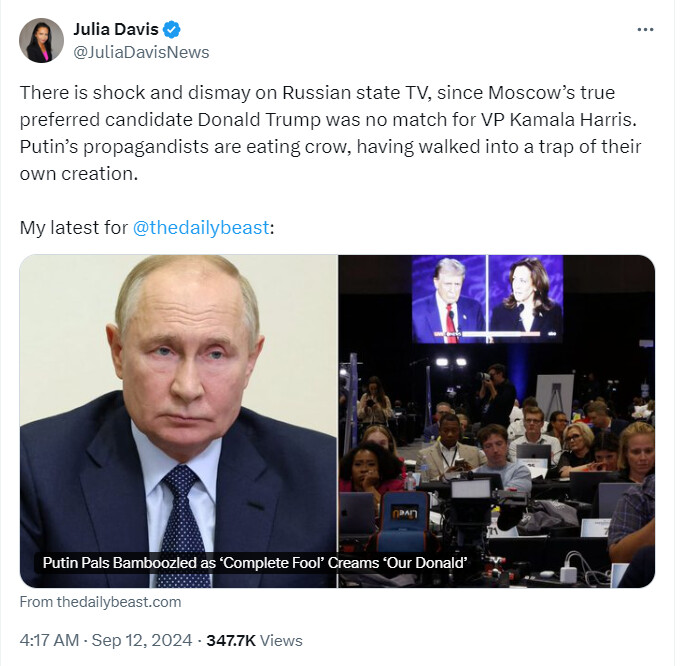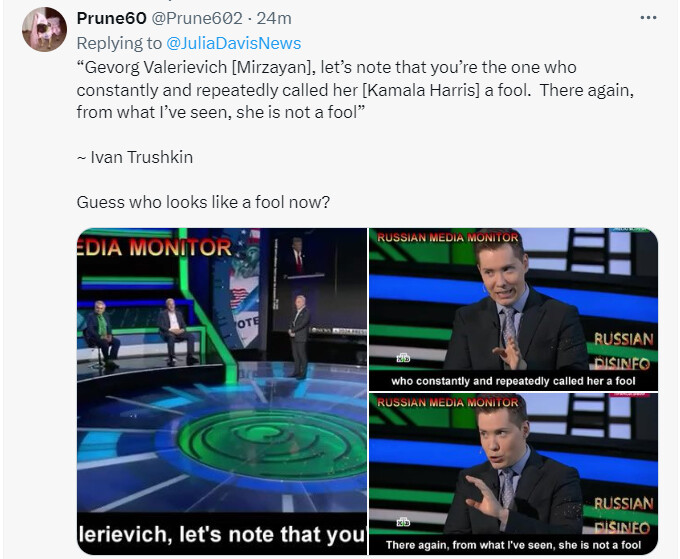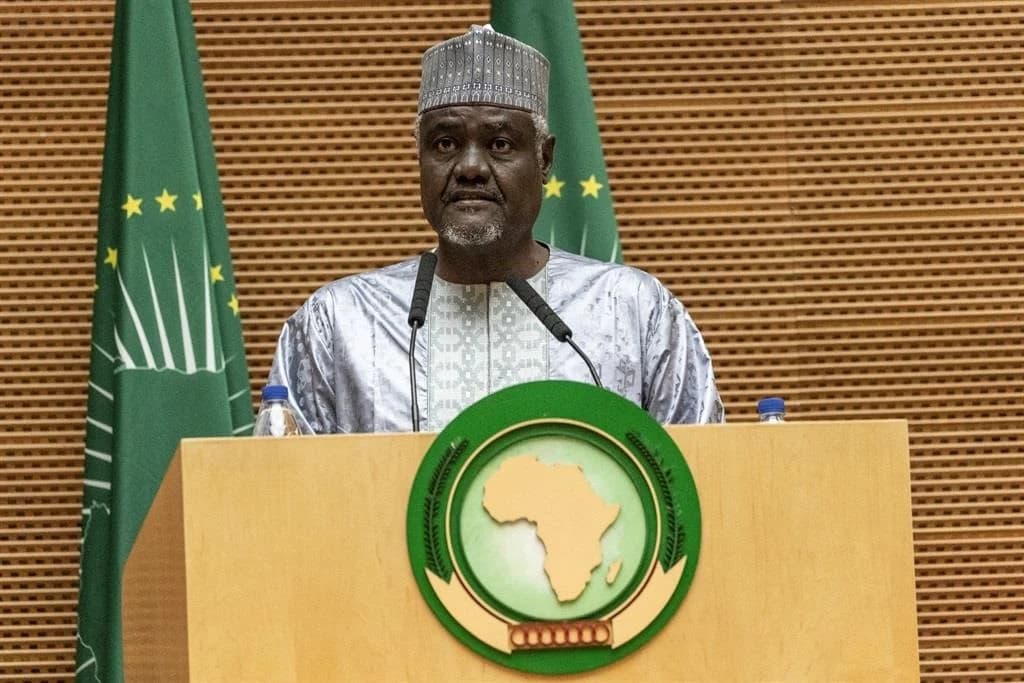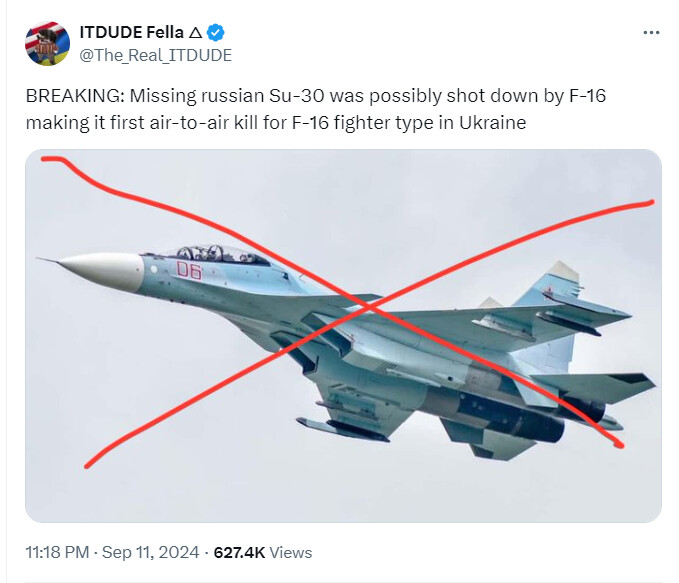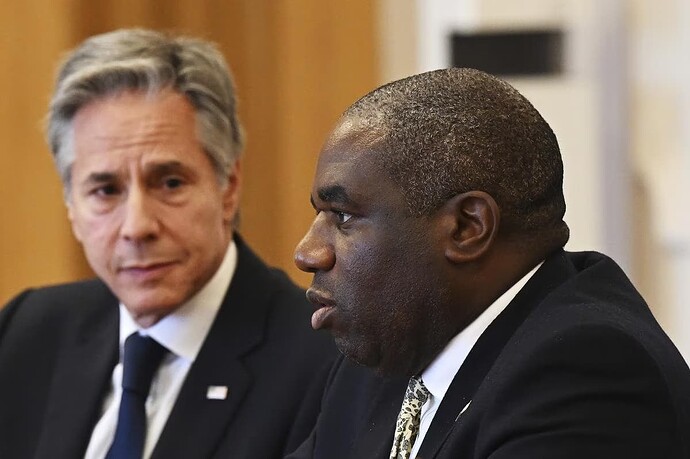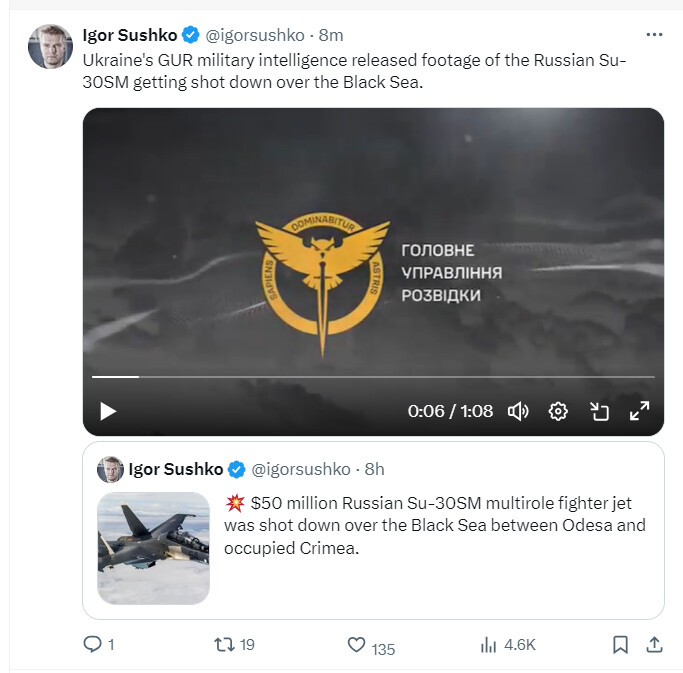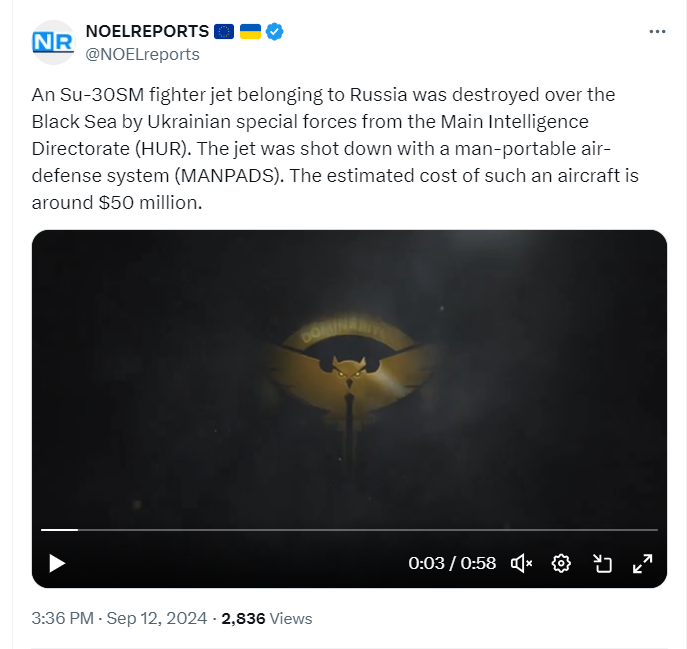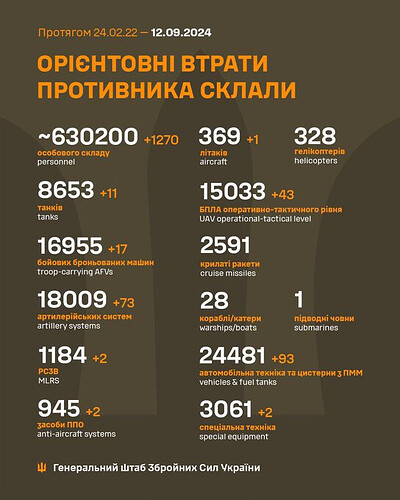So, just for compliance, I don’t want Blitzers taking the name of the lowlife, murderous, psychotic, authoritarian dictator Puck Futin in vain.
Repeat. Do not take s#ithead Putin’s name in vain.
In between invading his neighbour, displacing millions of people and killing at least a million hapless souls, farkwit dictator Putin is handing out peace prizes.
I kid you not.
Russia awards African Union a peace prize for preventing nuclear war
11 Sep
AU Commission chairperson Moussa Faki Mahamat. (Amanuel Sileshi/AFP)
- The African Union has won the first-ever Leo Tolstoy Prize for peace.
- Russian President Vladimir Putin, who is being sought for alleged war crimes, said the new prize supported international law.
- The award coincided with the AU celebrating 25 years since the Sirte Declaration.
The African Union has been awarded a new peace prize from Russia for what organisers said was its efforts to prevent a nuclear catastrophe or another world war.
The new Leo Tolstoy Prize award is named after the 19th-century Russian author and humanist, and was given to the African Union Commission (AUC) by the state-linked Tolstoy International Peace Prize Foundation.
It came with a message of support from Russian President Vladimir Putin, currently sought by the International Criminal Court (ICC) for alleged war crimes in Ukraine, who said the prize helped support international law.
“I consider your project to be an important and highly essential initiative aiming to facilitate the consolidation of the international public around the noble ideas of maintaining peace and security on the planet, upholding human rights and freedoms and forging a new, equitable multipolar international order, based on the principles of sovereign equality and respect for the legitimate interests of each other, as well as the primacy of international law,” said Putin, according to the Kremlin’s translation.
Russia is currently invading neighbouring Ukraine, where it has attacked electricity and rail infrastructure.
The award coincided with the AU celebrating 25 years since the Sirte Declaration calling for the establishment of the AU as it transitioned away from the Organisation of African Unity (OAU).
With relations between Russia and the West at a low not seen since the end of the Cold War, there has been a flurry of Russian activity around Africa.
Moscow this week unveiled a new statue of Nelson Mandela, alongside the release of a film about his life.
The AU attends gatherings on both sides, such as the United States Africa Democracy Summit and the Russia Africa Summit. It has also called for a political solution to the war in Ukraine.
AUC chairperson Moussa Faki Mahamat received the award and spoke of the continent’s “immense gratitude for this highly symbolic gesture”.
The award “nourishes the ardent and tenacious ambition to give substance to a collective, operational security, crowned by a lasting peace in Africa, with the deepest impact on global peace”, he said.
According to the Africa Center for Security Studies, the number of Africans forcibly displaced by conflict currently stands at some 40 million.
Reportedly, Zelensky has scheduled a visit to Washington soon, which will involve meetings with Trump and Harris as well as other political players.
Should be top secret until he gets there at least.
India… Ally to everyone and friend to no-one.
U.K. sanctions ten ships from Russia’s ‘shadow fleet’
Updated - September 11, 2024 09:14 pm IST - LONDON
Three of the vessels on the new sanctions list, Nikolay Zuyev, NS Asia and Zaliv Aniva, have, between them, transported more than $5 billion of Russian oil since Russia invaded Ukraine
US Secretary of State Antony Blinken, left, listens as UK Foreign Secretary David Lammy, right, speaks during the Fourth Crimea Platform Leaders Summit in Kyiv, Ukraine, on September 11, 2024. | Photo Credit: AP
The U.K. government, on Wednesday, announced sanctions on a “shadow fleet” of ten Russian oil tankers that it has alleged were circumventing Western oil sanctions.
The announcement coincided with a trip to Kyiv by U.K. Foreign Secretary David Lammy and U.S. Secretary of State Antony Blinken, who is on a trip to the U.K. and continental Europe. The announcement comes on the heels of Tuesday’s sanctions announcement from the U.K, France and Germany, who announced curbs on Iran for supplying missiles to Russia.
Also read | Shadow fleet tankers shipping dirty fuel in a setback for clean-up efforts
The European Union (EU) and Group of Seven (G-7) countries, including the U.K., are among those who have participated in U.S.-led sanctions on Russian oil, with petroleum being a critical source of funding for Russia’s war with Ukraine. The G-7 instituted a price cap of $60 per barrel of Russian oil in December 2022.
Wednesday’s sanctions bring the total number of ships on the U.K.’s proscribed list to 25. The tankers will not be allowed to dock at U.K. ports.
“Putin’s war machine is funded by a dark and illicit economic system that this government is committed to destabilising,” Mr. Lammy said.
Three of the vessels on the new sanctions list, Nikolay Zuyev, NS Asia and Zaliv Aniva, have, between them, transported more than $5 billion of Russian oil since Russia invaded Ukraine in February 2022, the U.K. government said.
“Russia has been forced to spend over $8 billion amassing this shadow fleet. But with sanctioned tankers loitering and unable to load oil, we are determined to make Putin’s investment an expensive misstep for the Kremlin,” Mr. Lammy added.
India is one of the top purchasers of oil from Russia, a move New Delhi has defended on grounds of national interest and market dynamics. The issue was discussed by Prime Minister Narendra Modi and Ukrainian President Volodymyr Zelenskyy on Mr. Modi’s visit to Kyiv in August, when the Ukrainian President had [urged India to stop purchases from Moscow]
Puck Futin forgot Newton’s Third Law. “For every action there is an equal and opposite reaction”.
The EU must soon open its doors to new members – its survival depends on it
The days when Viktor Orbán could block negotiations on a whim should be over – and the western Balkans should finally benefit
Wed 11 Sep 2024 02.00
Russia’s invasion of Ukraine has revived EU expansion as an imperative. For years, “enlargement” has been a low priority – Croatia was the last country to join the club, more than 10 years ago. But things have changed. Ursula von der Leyen told a forum in Bled, Slovenia I attended this month that Europe’s security depends on the 27-nation union expanding again. Thanks to Vladimir Putin, as the Albanian prime minister, Edi Rama, put it, enlargement is back on track.
The fact that expansion is a strategic priority makes it possible that new members will be admitted. But it doesn’t make it certain.
It is about 20 years since six western Balkan countries (Albania, Bosnia and Herzegovina, Montenegro, North Macedonia, Serbia and Kosovo) were promised hope of membership, but little progress has been made since then.
The Balkan countries don’t need the EU for security guarantees. Albania, Montenegro and North Macedonia are members of Nato, while Bosnia and Kosovo have a large Nato presence. It is a very different scenario from Europe’s east, where the absence of Nato’s shield to protect Ukraine, Moldova and the Caucasus means these countries view EU membership as a surrogate security guarantee.
But Ukraine’s EU membership drive in particular has created a palpable fear in the western Balkans of being left behind. Serbia wants nothing to do with Nato, and its close relationship with Moscow has complicated Belgrade’s bid to enter the EU, even more so since Russia’s large-scale invasion of Ukraine.
Yet, in important ways the latest momentum around EU enlargement is helping Balkan countries that aspire to join. Had it not been for the invasion of Ukraine, accession negotiations with Albania and North Macedonia would certainly still be stuck, and Bosnia and Herzegovina would not have been recognised as an EU candidate. Perhaps the EU would also not have agreed the budget for its new €6bn growth plan for the western Balkans. The plan makes European investments conditional on Balkan reforms, but if its full potential is realised, countries in the region could receive per capita almost as much money as full members are entitled to under the EU’s cohesion fund, which is designed to help poorer regions catch up.
This would make economic convergence between the EU and the western Balkans more than just a dream for the first time. A number of projects to put flesh on the bones of the region’s gradual European integration are in the pipeline, such as these countries’ inclusion in the European single Euro payments area. While scepticism of the EU’s intentions still abounds in Albania, the conversations I had during a recent visit to Tirana went beyond the usual list of complaints about Brussels’ unfair treatment of the region.
However, this is not enough. Von der Leyen’s next commissioner for enlargement should raise the level of ambition of what gradual integration can actually deliver, with carrots such as inclusion in the Schengen area considered. The negotiations over the EU’s next seven-year budget, which begin early next year and cover the 2028-2034 period, should also bake in the financial implications of including new members.
Most important, steps must be taken to eject the main poison from existing enlargement policy. For too long, enlargement has been hijacked by the whims of existing members seeking to promote their national interests. Be this Cyprus and Greece over Turkey, Greece and Bulgaria over North Macedonia, France (in the past) and Greece over Albania, or Hungary over Ukraine, the exploitation of the accession policy by different members to further their (legitimate or otherwise) interests has dramatically hampered its credibility by constantly moving the goalposts for applicant countries.
The main route through which this poison spreads is by giving EU governments an opportunity to block the process at every stage. Viktor Orbán’s Hungary doesn’t even try to hide this intention any more. Yet there is nothing in EU law that requires such interference by member states, which are only requested to greenlight the beginning and the end of the process. In previous enlargement rounds, the intermediary steps were correctly treated as technical matters in the hands of the Commission. It is possible politically and legally to revert to this method.
What this requires is a first mover to trigger a critical mass. Germany and Slovenia have already proposed ways to unburden the process. Other member states supportive of Europe integrating the western Balkans, such as Austria, Croatia, the Czech Republic, Italy and Slovakia, should follow suit. Countries such as Poland and the Baltics, with an interest in Ukraine and Moldova’s EU membership, and recent converts to enlargement such as France, should all make their voices heard.
There will be outliers such as Hungary, and perhaps Bulgaria, Greece and Cyprus. But as the history of European integration proves time and again, when a critical mass builds in favour of a decision, it is very difficult for recalcitrant members to resist for long. If supporters of an expanded EU are true believers, it is high time to show it through concrete policy action and not just words, less still questionable bilateral deals over migration such as that reached between Italy and Albania.
That’s the spirit.
Hit Russia in the hip pocket. The oligarchs don’t like that sort of ‘losing money’ thing and may in turn, take, political ‘corrective measures’.
Russia Economy Facing $6.5B Yearly Loss After Ukraine Blocks Gas Transit
Published Sep 11, 2024 at 12:07 PM EDTUpdated Sep 11, 2024 at 12:54 PM EDT
A deal that allows Russian natural gas to flow to Europe through Ukraine is set to end this year, delivering a “painful blow” to Moscow, which is already losing billions of dollars in revenues due to sanctions, an energy expert told Newsweek.
However, the expiry of the five-year gas transit agreement signed in 2019 between Ukraine’s state-run Naftogaz and Russia’s Gazprom could also see Kyiv lose a key revenue generator and add to uncertainty to Europe’s energy supply this winter.
Putin had been trying to make Europe more dependent on Russian gas. Since invading Ukraine in 2022, he used access to the fuel both to pressure Kyiv’s allies over their support in the war and to retaliate against Western sanctions.
However, Europe has found other long-term sources of gas imports, with Norway and liquefied natural gas (LNG) from the United States and elsewhere filling the gap.
Europe’s gas imports from Russia have fallen more than 90 percent and deprived of its most lucrative market. Gazprom Group, which includes oil and power businesses, has paid a heavy cost for Putin’s war, posting a net 2023 loss of $7 billion, its first in a quarter of a century.
Last year, Russia shipped 14.6 billion cubic meters across Ukraine in 2023, down almost two-thirds from the 41.6 bcm transited in 2021.
Although Putin has expressed willingness to continue the transit deal, his Ukrainian counterpart, Volodymyr Zelensky, has vowed to exclude “Russian molecules” from the country’s transit network.
Meanwhile, Bloomberg reported this week that it had calculated the loss of Ukrainian volumes equates to roughly $6.5 billion annually at current prices.
“Zelensky is finally severing its reliance on Russia by turning off the taps,” James Hill, CEO of MCF Energy, told Newsweek, “Gazprom is set to lose nearly $7 billion in revenues from this move, on top of last year’s $7 billion loss—a painful blow to Moscow.”
“While this represents a bold move and a step in the right direction on Zelensky’s part, it also presents a significant challenge which Europe must address before the contract expiration date in December,” Hill said, adding that Europe’s gas supply “may be at risk.”
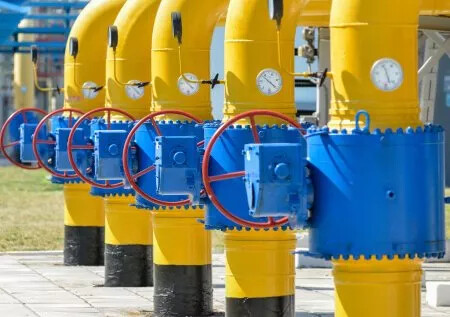
A compressor station of Ukraine’s Naftogaz national oil and gas company near Kharkiv. A natural gas transit deal between Moscow and Kyiv is set to expire at the end of 2024 which could hit revenues…
Gas flows through Ukraine provide less than 5 percent of the continent’s supplies, but no renewed deal would not just hurt Ukraine’s status as a reliable conduit but also risk losing $800 million a year in transit fees, according to Bloomberg, citing estimates from Mykhailo Svyshcho, from Kyiv-based ExPro Consulting.
Ukraine has held transit talks with Azerbaijan, which supplies gas to eight European countries, but as yet, there are “no concrete proposals from traders to be discussed,” Ukraine’s Energy Minister, German Galushchenko, said according to Bloomberg.
Deals with Kazakhstan and other Central Asian suppliers could also be possibilities, but time is running out before the end of the year.
“The five-year contract signed in 2019, prior to the war, has generated an extraordinary amount of monetary benefit for Kyiv and Moscow,” said Hill.
He said Ukraine and Europe must take an “aggressive” approach before and after the contract expires to ensure energy security and stability and to protect themselves from Moscow’s retaliation if it is not renewed.
“Moscow may consider an attack on the Ukrainian gas pipeline network, which to date has been largely left alone,” he said, “should this ensue, it could be catastrophic to Europe’s energy landscape.”
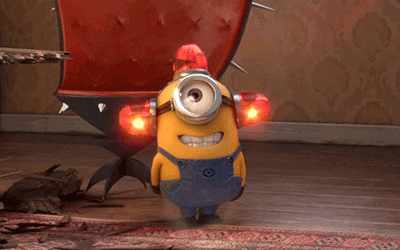
Is Uktsine still blocking the export of Russian fertiliser through that pipeline that runs through Ukraine to an outlet on the Black Sea?
This article is 2 day’s old, so yep, it appears that the fertiliser blockade is still ‘a thing’.
Russia Blasts Latvia, West for Blocking 55,000 Ton Fertilizer to Sri Lanka

ASIAN MAJESTY (IMO: 9724996) is a Bulk Carrier and is sailing under the flag of Singapore.
The Russian Embassy in Sri Lanka has expressed frustration over the prolonged delay of a vital consignment of Russian potash fertilizers intended for Sri Lanka, blaming Western authorities for holding the shipment in limbo for over a year.
In a press release issued today, the embassy highlighted the case of the vessel Asian Majesty, which has been stuck at the Port of Riga, Latvia, since mid-2023. The ship carries 55,000 tons of potash fertilizers worth an estimated $34 million, earmarked for Sri Lankan use. However, despite various payments, including $37 million for delivery services, the shipment has remained stationary.
The embassy’s statement follows a recent press conference by Russian Ambassador Levan Dzhagaryan, where the issue was first raised. According to the embassy, mounting fees for the shipment’s standstill have reached $31 million, exacerbating the financial burden.
The embassy further criticized the Latvian authorities, stating that they are considering the nationalization of the potash fertilizers, which Russia deems unacceptable. “How such a cynical attitude of the West can be possible in a world where everybody seems to support the idea of a strong Global South?” the statement reads, underscoring Russia’s dissatisfaction with Western actions toward the Global South.
The press release has intensified the focus on this unresolved issue, which was already gaining attention in local Sri Lankan media. With no resolution in sight, the embassy calls for a swift conclusion to the matter, urging international stakeholders to intervene.
Agricultural products and fertilisers are exempt from trade sanctions by the EU and most in the Western camp, connected to the adverse impact on African countries, some of which continue to be affected by drought and/or floods as well as internal conflicts
They are a valuable source of revenue for Russian oligarchs and the State, some of it from WFP and NGO purchases for Africa, but actions through denial of access to ports, indirect banking measures and freezing of assets held in European Banks could be counter to the continuous supply to developing countries.
It’s another avenue for Russia to exploit divisions between the Global South and the Developed West , keeping the Global South onside in not opposing Russia’s invasion of Ukraine.
Andrew Perpetua has started counting the Russian deaths on video each day. Limited to what he personally sees, not all the videos his team are analysing.
1627 over the last 20 days.
That’s about 30,000 dead over a year as a very conservative minimum. There’s more videos that could be added to the count and vastly more that die without footage.
Russian losses per 12/09/24 reported by the Ukrainian general staff
+1270 men
+11 tanks
+17 AFVs
+73(!) artillery systems
+2 MLRS
+2 AD systems
+1 aircraft
+43 UAVs
Wow. Busy day.
I’d just got to thinking that the large loses of Russian artillery systems was over. You know, that perhaps Russia were running low on artillery, of any sort.
Today’s statistics has restored my faith in Russia’s desire for nihilist self destruction.
The higher numbers of artillery pieces being destroyed in recent days are likely older pieces, coming out of storage.
WW2 lasted 6 years and 1 day. So, about 2,191 days, give or take a leap year.
Russian current losses in Ukraine
630,200 ÷ 929 days of war = 678 daily average.
678 multiplied by the 2,191 days of WW2 would equal 1,486,286 removed from the battlefield, should the Ukrainian war be of the same duration.
Alternatively
The last seven day average of 1,225.71 muliplied by the 1,262 remaining days duration of WW2, equals 1,546,864. Added to the total of the previous 929 days of 630,200 equals 2,177,040
That’s some ‘Special Operation’ Puck Futin has initiated.
